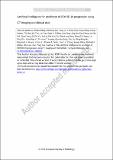| dc.contributor.author | Wang, Robin | |
| dc.contributor.author | Jiao, Zhicheng | |
| dc.contributor.author | Yang, Li | |
| dc.contributor.author | Choi, Ji W. | |
| dc.contributor.author | Xiong, Zeng | |
| dc.contributor.author | Halsey, Kasey | |
| dc.contributor.author | Tran, Thi M. L. | |
| dc.contributor.author | Pan, Ian | |
| dc.contributor.author | Collins, Scott A. | |
| dc.contributor.author | Feng, Xue | |
| dc.contributor.author | Wu, Jing | |
| dc.contributor.author | Chang, Ken | |
| dc.contributor.author | Shi, Lin-Bo | |
| dc.contributor.author | Yang, Shuai | |
| dc.contributor.author | Yu, Qi-Zhi | |
| dc.contributor.author | Liu, Jie | |
| dc.date.accessioned | 2022-02-03T19:53:48Z | |
| dc.date.available | 2021-12-10T12:50:10Z | |
| dc.date.available | 2022-02-03T19:53:48Z | |
| dc.date.issued | 2021-07 | |
| dc.date.submitted | 2021-02 | |
| dc.identifier.issn | 1432-1084 | |
| dc.identifier.uri | https://hdl.handle.net/1721.1/138416.2 | |
| dc.description.abstract | Objectives
Early recognition of coronavirus disease 2019 (COVID-19) severity can guide patient management. However, it is challenging to predict when COVID-19 patients will progress to critical illness. This study aimed to develop an artificial intelligence system to predict future deterioration to critical illness in COVID-19 patients.
Methods
An artificial intelligence (AI) system in a time-to-event analysis framework was developed to integrate chest CT and clinical data for risk prediction of future deterioration to critical illness in patients with COVID-19.
Results
A multi-institutional international cohort of 1,051 patients with RT-PCR confirmed COVID-19 and chest CT was included in this study. Of them, 282 patients developed critical illness, which was defined as requiring ICU admission and/or mechanical ventilation and/or reaching death during their hospital stay. The AI system achieved a C-index of 0.80 for predicting individual COVID-19 patients’ to critical illness. The AI system successfully stratified the patients into high-risk and low-risk groups with distinct progression risks (p < 0.0001).
Conclusions
Using CT imaging and clinical data, the AI system successfully predicted time to critical illness for individual patients and identified patients with high risk. AI has the potential to accurately triage patients and facilitate personalized treatment.
Key Point
• AI system can predict time to critical illness for patients with COVID-19 by using CT imaging and clinical data. | en_US |
| dc.publisher | Springer Berlin Heidelberg | en_US |
| dc.relation.isversionof | https://doi.org/10.1007/s00330-021-08049-8 | en_US |
| dc.rights | Article is made available in accordance with the publisher's policy and may be subject to US copyright law. Please refer to the publisher's site for terms of use. | en_US |
| dc.source | Springer Berlin Heidelberg | en_US |
| dc.title | Artificial intelligence for prediction of COVID-19 progression using CT imaging and clinical data | en_US |
| dc.type | Article | en_US |
| dc.identifier.citation | Wang, Robin, Jiao, Zhicheng, Yang, Li, Choi, Ji W., Xiong, Zeng et al. 2021. "Artificial intelligence for prediction of COVID-19 progression using CT imaging and clinical data." | en_US |
| dc.contributor.department | Harvard University--MIT Division of Health Sciences and Technology | |
| dc.relation.journal | European Radiology | en_US |
| dc.eprint.version | Author's final manuscript | en_US |
| dc.type.uri | http://purl.org/eprint/type/JournalArticle | en_US |
| eprint.status | http://purl.org/eprint/status/PeerReviewed | en_US |
| dc.date.updated | 2021-12-10T04:20:57Z | |
| dc.language.rfc3066 | en | |
| dc.rights.holder | European Society of Radiology | |
| dspace.embargo.terms | Y | |
| dspace.date.submission | 2021-12-10T04:20:57Z | |
| mit.journal.volume | 32 | en_US |
| mit.license | OPEN_ACCESS_POLICY | |
| mit.metadata.status | Authority Work Needed | en_US |
